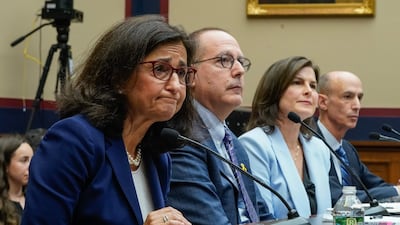The president of Columbia University took a stand against anti-Semitism on Wednesday as she denied accusations from Republicans who see the New York campus as a hotbed of bias.
But Nemat Shafik was more guarded over whether certain phrases from some supporters of Palestinians were forms of harassment.
Ms Shafik and board of trustees members were questioned by members of the House of Representatives committee on education and the workforce about their response to claims of on-campus anti-Semitism.
She arrived on Capitol Hill four months after a similar hearing that led to the resignations of two Ivy League university presidents.
From the start, Ms Shafik took a more decisive stance than the presidents of Harvard and the University of Pennsylvania, who gave lawyer-like answers when asked whether calls for the genocide of Jews would breach school policies.
She and three other Columbia officials responded unequivocally that it would. But Ms Shafik seemed to prevaricate on specific phrases.
Representative Lisa McClain, a Republican from Michigan, asked her if phrases such as “from the river to the sea, Palestine will be free” or “long live intifada” are anti-Semitic.
“I hear them as such; some people don't,” Ms Shafik said.
Ms McClain posed the same question to David Schizer, who leads an anti-Semitism task force at Columbia.
Mr Schizer responded that such phrases are anti-Semitic.
It was a shaky moment for Ms Shafik, who otherwise avoided the type of answers that turned the previous hearing into a frenzy for Republicans, who say elite schools are havens for anti-Semitism.
“Anti-Semitism has no place on our campus and I am personally committed to doing everything I can to confront it directly,” Ms Shafik said.
“Columbia strives to be a community free of discrimination and hate in all its forms and we condemn the anti-Semitism that is so pervasive today."
Ms Shafik said the university has suspended 15 students and taken disciplinary action against several faculty members.
“We have 37,000 students and I think the numbers that we are talking about who are crossing these lines are, you know, a very, very small number,” she said.
The Columbia administrators were the latest school leaders called before Congress for questioning about protests at US university campuses related to the Israel-Gaza conflict.
University of Pennsylvania president Liz Magill resigned in December after her responses to a congressional committee and Harvard University's Claudine Gay stepped down in January.
The fallout from the conflict has been felt around the world, and is particularly intense on US university campuses, where both pro-Israel and pro-Palestinian groups say they are being victimised and silenced.
The hearing came after the University of Southern California cancelled plans this week for a May 10 graduation speech by a Muslim student over what it said were safety concerns.
Pro-Israel groups had criticised the selection of Asna Tabassum as the class valedictorian, accusing her of using “anti-Semitic and anti-Zionist" speech.
Ms Tabassum condemned the decision, which she said was the result of the university “succumbing to a campaign of hate meant to silence my voice”.

